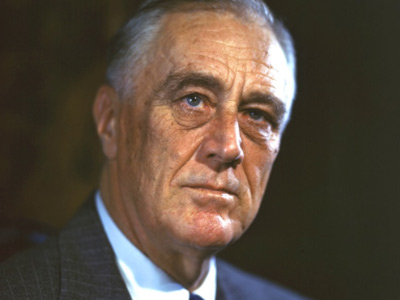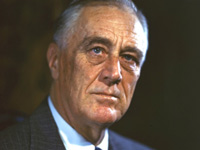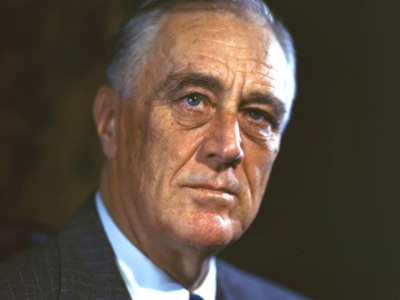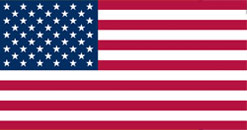Franklin Delano Roosevelt (1882-1945)

Early Life
Roosevelt was born on January 30, 1882, in the Hudson Valley town of Hyde Park, New York, to businessman James Roosevelt and his wife, Sara Ann Delano. Roosevelt's parents, who were sixth cousins, both came from wealthy old New York families, the Roosevelt family and the Delano family, respectively. They were of mostly English descent; Roosevelt's patrilineal great-grandfather, Jacobus Roosevelt III, was of Dutch ancestry, while his mother's maiden name could be traced to French Huguenot immigrant ancestors of the 17th century. Franklin was the only child of James and Sara's marriage, though James had another son, James "Rosy" Roosevelt, from a previous marriage.
Roosevelt grew up in an atmosphere of privilege. His father, had graduated from Harvard Law School in 1851 but chose not to practice law after receiving an inheritance from his grandfather. James was a prominent Bourbon Democrat; when he took along five-year-old Franklin to see President Grover Cleveland, the busy president told Franklin, "I have one wish for you, little man, that you will never be President of the United States." Sara was the dominant influence in Franklin's early years; she once declared, "My son Franklin is a Delano, not a Roosevelt at all." James, who was 54 when Franklin was born, was considered by some as a remote father, though biographer James MacGregor Burns indicates James interacted with his son more than was typical at the time. Frequent trips to Europe—he made his first excursion at the age of two and went with his parents every year from the ages of seven to fifteen—helped Roosevelt become conversant in German and French.
Roosevelt attended Groton School, an Episcopal boarding school in Groton, Massachusetts; 90% of the students were from families on the social register. He was strongly influenced by its headmaster, Endicott Peabody, who preached the duty of Christians to help the less fortunate and urged his students to enter public service. Forty years later Roosevelt said of Peabody, "It was a blessing in my life to have the privilege of [his] guiding hand", and the headmaster remained a strong influence throughout his life, officiating at his wedding and visiting Roosevelt as president.
Like all but two of his twenty one Groton classmates, Roosevelt went to Harvard College in nearby Cambridge, Massachusetts. Roosevelt was again an average student academically, and he later declared, "I took economics courses in college for four years, and everything I was taught was wrong." He was a member of the Alpha Delta Phi fraternity and the Fly Club. Roosevelt was undistinguished as a student or athlete, but he became editor-in-chief of The Harvard Crimson daily newspaper, a position that required great ambition, energy, and the ability to manage others.
Roosevelt's father died in 1900, causing great distress for him. The following year, Roosevelt's fifth cousin Theodore Roosevelt became President of the United States. Theodore's vigorous leadership style and reforming zeal made him Franklin's role model and hero. Nonetheless, Roosevelt campaigned for Theodore's opponent, William Jennings Bryan, in the 1904 presidential election. Roosevelt graduated from Harvard in 1903 with an A.B. in history. He later received an honorary LL.D. from Harvard in 1929. Roosevelt entered Columbia Law School in 1904, but dropped out in 1907 after passing the New York bar exam. Many years later, he posthumously received a J.D. from Columbia Law School. In 1908, he took a job with the prestigious Wall Street firm of Carter Ledyard and Milburn, dealing mainly with corporate law.
HISTORY

RESOURCES
This article uses material from the Wikipedia article "Franklin Delano Roosevelt (1882-1945)", which is released under the Creative Commons Attribution-Share-Alike License 3.0.
© Stories Preschool. All Rights Reserved.










